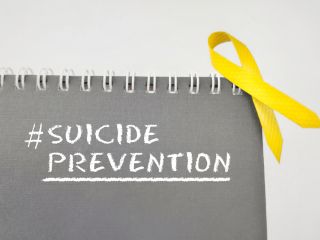SUICIDE- Preventing Suicide Using a Mindfulness-Based Intervention. The details of Mindfulness-Based Cognitive Therapy to Prevent Suicide (MBCT-S). Reviewed by Ray Parker

KEY POINTS-
- Mindfulness-Based Cognitive Therapy to Prevent Suicide (MBCT-S) shows promise in reducing suicide risk.
- MBCT-S is a 9-session treatment that is delivered mostly in a group setting by trained MBCT-S instructors.
- MBCT-S is being adapted for telehealth.

In a recent randomized clinical trial, we found adding Mindfulness-Based Cognitive Therapy to Prevent Suicide (MBCT-S) to treatment-as-usual reduced the total number of suicide events and the proportion of high suicide-risk veterans, who had a suicide attempt or acute psychiatric hospitalization over a 12-month period (Interian et al., 2021).
Publication of these findings represented a decade-long effort to develop and test a mindfulness-based intervention (MBI) to prevent suicide.
Why Use a Mindfulness-Based Intervention to Prevent Suicide?
Ten years ago, using an MBI to prevent suicide among high suicide-risk individuals was not really done. Instead, MBIs were mostly being used, and were found to be useful for, preventing relapse among those who were currently well but had a history of mental health difficulties. At the time, however, there were a number of good reasons to try a MBI to prevent suicide including:
Practical Reasons
Suicide is a leading cause of death, as it has been for decades (Centers for Disease Control and Prevention, 2023). Available suicide prevention interventions worked, but only for some high suicide-risk individuals. Moreover, as remains true today, many suicidal individuals do not engage in treatment, even immediately following a suicidal crisis. Thus, a different approach to preventing suicide could potentially help to prevent suicide among those vulnerable to suicidal behavior.
Scientific Rationale
MBIs were known to work for those with difficulties linked to suicide, such as those with a history of recurrent major depressive disorder. MBIs were found to change cognitive and emotional factors associated with suicide risk, including reactivity to negative thoughts and feelings. Today, a biological basis to such changes are found: MBIs change neural functioning in a way that promotes cognitive control and emotional non-reactivity.
Theoretical Rationale
According to Theravadan Buddhist texts and Vipassana or insight meditation practice, which are the ideas and practices on which current MBIs are based, over time, practicing mindfulness meditation can promote clarity of awareness, which in turn can promote equanimity. In other words, with mindfulness meditation practice, an individual can develop the ability to recognize experience, as well as additions to experience (e.g., judgments about the experience). With clarity of awareness or mindfulness, a recognition that things change develops.
Particularly important to our theoretical rationale for using an MBI for suicide prevention was the belief that the skills and principles that can be learned through mindfulness meditation (i.e., mindfulness or clarity of awareness, equanimity, and impermanence) could ultimately be applied to suicidal crisis, and otherwise difficult experiences, to improve suicidal crisis management.
What Our Intervention Consisted of
Our MBI to prevent suicide, called Mindfulness-Based Cognitive Therapy to Prevent Suicide (MBCT-S), consisted of a combination of the Stanley-Brown Safety Plan (Stanley & Brown, 2012) and MBCT (Segal, Williams, & Teasdale, 2012) adapted to target suicidal thoughts and individual warning signs for suicide. MBCT-S is a 9-session treatment that is delivered mostly in a group setting by trained MBCT-S Instructors (Kline et al., 2016).
MBCT-S been shown to be effective in reducing suicide events among high suicide-risk patients. Subsequently, MBCT-S, relative to TAU, was found to improve or maintain attentional control under affective provocation in these patients (Chesin et al., 2021). This suggests a theoretically and empirically relevant target for a suicide prevention intervention.
Moreover, in a subset of high suicide-risk patients who were also misusing opioids, MBCT-S, in comparison to TAU alone, contributed to a more than 80 percent, albeit not significant, reduction in SA and an almost 60 percent reduction in acute psychiatric hospitalization over 12-months follow-up (Chesin et al., 2022).
What’s next?
Currently, we are probing the utility and helpfulness of MBCT-S when delivered via telehealth, as well as whether certain suicidal individuals (e.g., those with certain clinical histories or diagnoses) are more or less likely to benefit from MBCT-S.
If you or someone you love is contemplating suicide, seek help immediately. For help 24/7 dial 988 for the National Suicide Prevention Lifeline, or reach out to the Crisis Text Line by texting TALK to 741741.
- Questions and Answers
- Opinion
- Motivational and Inspiring Story
- Technology
- Live and Let live
- Focus
- Geopolitics
- Military-Arms/Equipment
- Seguridad
- Economy
- Beasts of Nations
- Machine Tools-The “Mother Industry”
- Art
- Causes
- Crafts
- Dance
- Drinks
- Film/Movie
- Fitness
- Food
- Juegos
- Gardening
- Health
- Home
- Literature
- Music
- Networking
- Other
- Party
- Religion
- Shopping
- Sports
- Theater
- Health and Wellness
- News
- Culture

